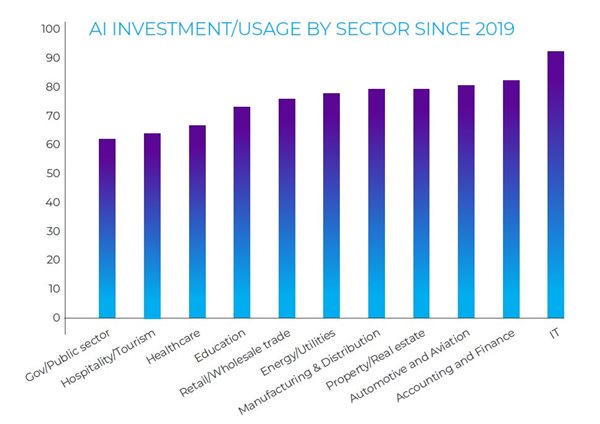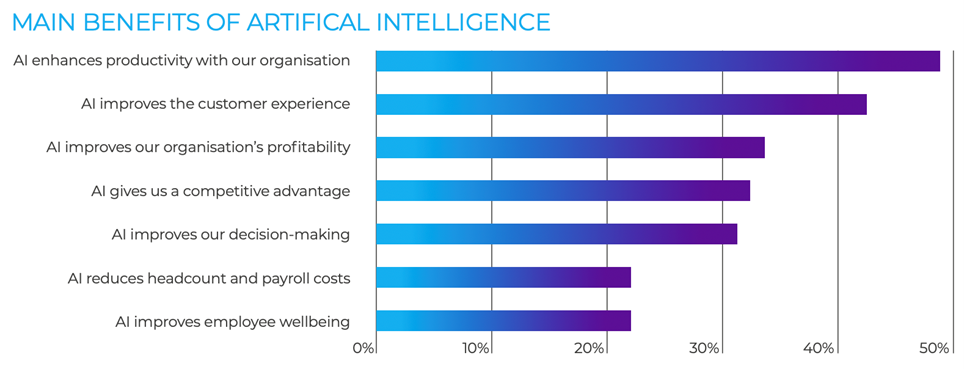The majority of ambitious, mid-sized businesses across the world see artificial intelligence, or AI, as a growth opportunity despite the ongoing debate about the technology’s impact on humanity.
AI optimists such as Microsoft founder Bill Gates are emphatic that AI will boost productivity and creativity by removing the need for humans to do boring, repetitive jobs – while tech pioneer Elon Musk and fellow sceptics believe it will simply remove the need for humans. Period.
As the existential arguments swirl around them, business leaders are pressing on with investment in AI. The artificial intelligence market was worth around $100 billion in 2021 but estimates suggest it could rise to around $2 trillion by 2030.
Moore Intelligence has completed one of the most comprehensive studies on attitudes to AI, focusing on ambitious mid-tier companies that are the engine room of the global economy.
Analysing views on AI in boardrooms across 12 major economies, the research found widespread adoption across geographies and industry sectors – with 77% of respondents increasing investment in or usage of AI over the last four years.

That means the vast majority of businesses are engaging with artificial intelligence and exploring how the technology could improve their operations. Only 4% do not expect AI to grow or play a part in their business in the near future.
The research, conducted by the Centre for Business and Economics Research (Cebr), revealed 56% of business leaders say AI represents a opportunity for their organisation – compared to 23% that see it as a threat.
Companies with at least 250 employees reporting the fastest AI adoption have seen average revenue growth of 15% between 2019 and today – more than double the rate at firms where investment in or use of the technology has stalled over the past four years.
To achieve positive results companies have invested an average of $1.5 million in the technology over the past year – rising to $3.2 million for the automotive and aviation sectors.
Other key findings:
• 65% expect the use of AI to grow within their organisation over the next three years and beyond.
• Productivity enhancements are the most commonly perceived benefit of AI, cited by 48% of decision makers. Improving customer experience was the next most frequently cited benefit.
• Only 22% of respondents saw AI as a means of reducing headcount or payroll costs.
• A mere 2% maintain AI offers no benefits to their operations

Of business leaders in our survey see AI as an opportunity
Key to the future
While AI adoption has been widespread over the past four years, there are some significant differences in the rate of take-up across geographies and sectors.
The researchers surveyed almost 2,000 business leaders in Australia, Brazil, France, Germany, Hong Kong, Italy, the Netherlands, South Africa, Spain, the United Arab Emirates, the United Kingdom and the United States.
Brazil has the highest rate of AI adoption over the past four years, with 92% of decision makers increasing their investment or usage. Spain was next with 86% uptake.
In contrast, the lowest level of AI engagement was in hi-tech Hong Kong. However, at 58% that still means a majority of companies are looking at AI in some way.
Further analysis reveals a similar spread of adoption rates in different industries.
Perhaps unsurprisingly, 89% of decision makers in information, communication and technology report increased investment in or usage of AI since 2019 – the highest rate of adoption in major sectors.
Accounting and finance, where it has been argued for several years that automation could be transformational, also has an AI investment and adoption rate above 80%.
The rate is above 70% across most of the world’s main industries: retail; energy; oil and gas; manufacturing and distribution; property; automotive and aviation.
The argument that uptake of new innovations is generally faster in the private sector is borne out by the fact that government and the public sector reported the lowest rate of adoption. However, a majority of public sector respondents, 58%, say investment in or usage of AI increased over the four-year period under review.

revenue growth for companies identified as the fastest AI adopters
The varying sums invested in AI across countries and sectors is illuminating.
Automotive and aviation lead the way the typical mid-to-large business reporting investment of $3.2 million in AI technology over the past year. This is more than twice the average level of investment, which is $1.5 million
Spending is also slightly above trend in the information, communication and technology sector – averaging $1.9 million per enterprise.
Education shows the weakest investment figure. Nevertheless, it still amounts to an average outlay of $600,000 per organisation.
The US leads the way in terms of countries, a reflection of its position as the world’s largest economy with arguably the most advanced technology sector.
Based on the values reported by US businesses in this sample, an estimated $89 billion was invested in artificial intelligence over the past year across the country.
Meanwhile, Australia was the country with the highest average investment per company, with typical larger businesses ploughing $2.1 million each into AI over the past year. That equates to total investment of $8.9 billion among companies with more than 250 employees.
Germany, Brazil and Italy were also above the investment average, while French, UAE and Spanish firms all spent more than $1 million on average.
Hong Kong, with the lowest level of AI adoption in the countries surveyed, also has the weakest investment levels, with companies spending $600,000 on average – less than half the typical spending level.
It is clear from the large uptake rate and amount of money invested that business decision makers have identified tangible benefits in using artificial intelligence in their operations. In fact, only 2% of respondents stated that AI offered no benefits at all.
Jobs at risk?
Enhancing productivity was the main benefit identified, singled out by 48% of respondents.
In Brazil and Australia the emphasis on productivity improvements was even higher, at 63% and 54% respectively. This is no surprise as these countries are among the leading adopters and investors and will have collated a great deal of evidence on the effectiveness of the technology.
On a sector basis, energy has the largest share of respondents citing potential productivity improvements from AI investment, at 57%.
The next most common response was that AI helps to improve the customer experience, a view shared by 43% of respondents.
The figure for this option was even higher in retail and education, almost 50%. These sectors are always looking for technological solutions that allow them to coordinate processes and deliver high levels of service.
One of the recurring narratives about artificial intelligence is that it will lead to a hollowing out of the employment market and render certain occupations redundant in the future – particularly repetitive tasks.
However, only 22% of business leaders in our study cite reducing headcount and payroll costs as their reason for turning to AI. This suggests technology is not currently seen as a means of displacing workers on a large scale.
There was divergence across sectors on this issue. Some 31% leaders in automotive and aviation – who invest more than most in AI – see the potential to reduce headcount and payroll as the main benefit of the technology. However, only 7% of firms in law and other professional services, are focused on reducing personnel numbers.
Despite the perceived benefits of AI, Moore Global’s industry sector leaders are unanimous that many of these have not yet been fully realised.
While the technology may enhance productivity for some businesses, it could also pose fundamental challenges to others. In some industries, entire revenue and operational models may have to change.
Nevertheless, the majority of respondents – 56% – say that AI represents an opportunity for their organisation, far outweighing the 23% share worried about it as a threat.
Property and real estate are the most optimistic sectors, with 70% of leaders believing AI will create growth opportunities. Manufacturing and distribution along with automotive and aviation are not far behind at 64% and 62% respectively.
In services the mood is more downbeat. More than 30% of firms in law and other professional services, perceive AI to be a threat to their organisations.
In stark contrast, less than 15% of leaders in manufacturing and hospitality are wary of AI. This reflects their greater reliance on experienced workers, often with specific skill sets, relative to other sectors.
Looking ahead, decision makers expect AI to become ever more important.
Across those we surveyed on six continents, 65% expect the use of AI to grow within their organisation over the next three years and beyond.
This view was particularly prevalent in emerging markets, with more than 70% agreement in Brazil, South Africa and the United Arab Emirates.
Nearly three-quarters of leaders in information, communication and technology businesses expect the use of AI within their organisation to grow over the next three years and beyond.
A further 24% of the sample expect AI usage to continue growing over the next three years, but to eventually lose momentum. That view was most prevalent in France, shared by four-in-ten respondents.
Researchers also found a small cohort of even more sceptical bosses: 4% of respondents say they do not expect AI to grow over the coming three years or play any role in their organisation over this period.
However, the vast majority of business leaders see artificial intelligence as a vital investment that can make a significant impact on both the top and bottom lines. They are embracing change and being rewarded with improved financial performance while, at the same time, making their companies more sustainable for the future.
Accountants spend more on AI
Accountants and other financial firms are investing above-average amounts on artificial intelligence tools.
The Moore Global study reveals mid-cap accounting and finance businesses each spent $1.6 million on AI over the past year. That is slightly about the average in our study of $1.5 million and almost four times the figure for law and professional services, which stands at $480,000.
Only 2% of accounting and finance businesses said they saw no role for AI over the coming three years – a stark contrast to law and professional services firms, where 7% of respondents see no immediate need for the technology.
Almost three-quarters (72%) of respondents in accounting and finance expect the use of AI within their organisation to grow over the next three years and beyond. This is slightly above the average for all industries in our survey of 65% and is considerably higher than the equivalent figure for law and other professional services, which is 43%.


Only one accounting and finance firm in our global survey of nearly 2,000 businesses in 12 major economies said there were no benefits to be gained from using AI.
The most commonly perceived benefit of artificial intelligence is enhancing productivity, which is cited by 48% of respondents across all sectors.
The share of accountancy firms picking productivity as the main reason for their investment is slightly lower at 44% but the sector largely reflects the view in other industries.
Fears have been expressed over the past two years that technology could lead to widespread job losses in the profession but investing in AI specifically to reduce payroll and headcount is currently well down the priority list. Only 20% of accounting and finance businesses selected this as one of the main benefits of AI.

























